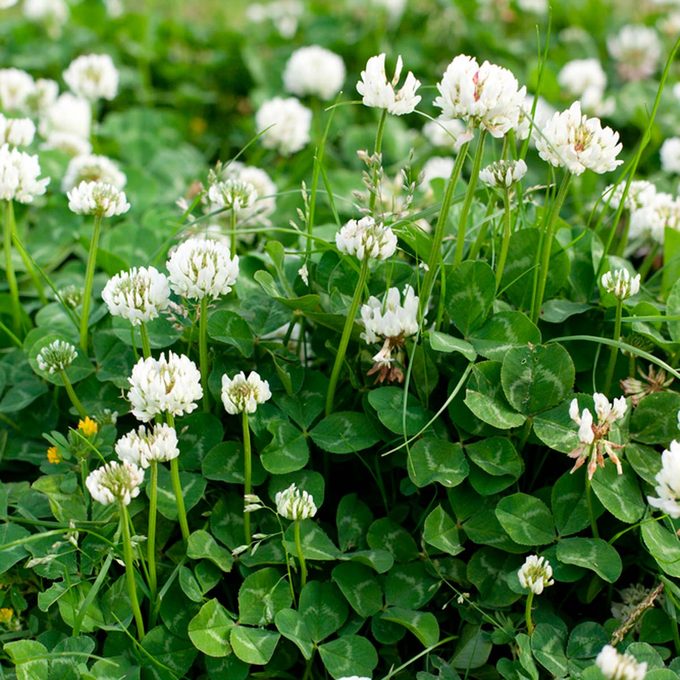Why You Should Consider Planting a Clover Lawn
Easy-to-grow clover is a beautiful and sustainable alternative to a traditional turf grass lawn. Here'southward what you demand to know.

If you're looking for environmentally friendly, sustainable alternatives to a turf grass lawn, exist sure to take a expert await at clover. Easy-to-grow clovers do not require mowing, but they help continue the lawn green and create a nourishing playground for bees, collywobbles and other pollinating insects.
What You Need to Know Near Clover Lawns
For decades, clover was a part of any mix of lawn seed. But about 60 years ago, information technology fell out of favor considering new weed killers on the market eliminated information technology along with dandelions. It presently became known equally a weed, and now herbicides tout their clover-killing prowess.
But clover is regaining popularity every bit a lawn, in part because it doesn't crave chemicals or fertilizers. In fact, lawn chemicals will kill it. It tin can be seeded as the lawn for new construction or sown into an existing lawn, often mixed with fescues and bluegrass.
"I recommend information technology in Bahia turf if clients take a pet, because it takes dog urine without getting urine spots," says Teresa Watkins, a Florida landscape designer with SHE Consulting and cohost of the Better Lawns and Gardens podcast.
Clovers are winter hardy to -35 degrees F. They are less tolerant in the heat of the southward, where they tend to be grown every bit a winter annual. "In the south information technology thrives in winter and spring but sometimes can't have the heat in summer, and then it should be planted into existing turf," Watkins says. "It does come back each year from seeds and spreads."
Clovers spread past underground stems called rhizomes, which easily allow the plants to creep through the lawn.
Benefits of a Clover Lawn
- Requires no chemicals or fertilizers;
- Drought tolerant;
- Low or no mow;
- Stays greenish year-round in northern lawns;
- Pulls plant-nourishing nitrogen from the environment to replenish the soil;
- Chokes out weeds;
- Clover flowers back up bees;
- Rabbits like clover, and many gardeners say Dutch clover planted in the lawn reduces bunny interest in vegetables and other plants.
Drawbacks of a Clover Lawn
- Difficult to remove clover stains from vesture;
- Doesn't concord up to heavy human foot traffic by itself, though clover mixed with grass provides a tough turf;
- As a short-lived perennial may need to be replanted every three years, specially if it does not self-sow or spread;
- Bee allergy concerns. If that's a worry, mow the clover to keep it from flowering.
What Kind of Clover Should I Plant?
Depression-maintenance Dutch clovers and microclovers, strains in the family unit of white clovers, are currently the tiptop choices. The primary difference betwixt the 2 is elevation — Dutch clover is slightly taller than microclover, which tends to have smaller leaves and is more compact. (Note that the height of clover will be somewhat restrained when it's growing within a grass lawn.) Other than size, Dutch white clover and microclover share the aforementioned characteristics and growing requirements.
How to Grow a Clover Backyard
Spring is the best fourth dimension to start a backyard of clover or to add clover to your existing lawn. Sow Dutch clover and microclover the same fashion. They do best in full sun but tolerate shade. Sow two to 3 pounds of seed per 1,000 square feet. The amount of clover seed to sow is the same for a new backyard or for filling in patches. Clover should germinate in less than a week.
Broadcast clover seed in existing lawns. On bare soil or thin patches in the backyard, sow the seed, gently rake and water it in. If sowing in shade, consider doubling the corporeality of seed sown. Continue moist until the clover gets established. Fertilizer is not necessary.
As it grows, keep your eye out for the lucky four-foliage version.
Source: https://www.familyhandyman.com/article/consider-growing-clover/
0 Response to "Why You Should Consider Planting a Clover Lawn"
Post a Comment